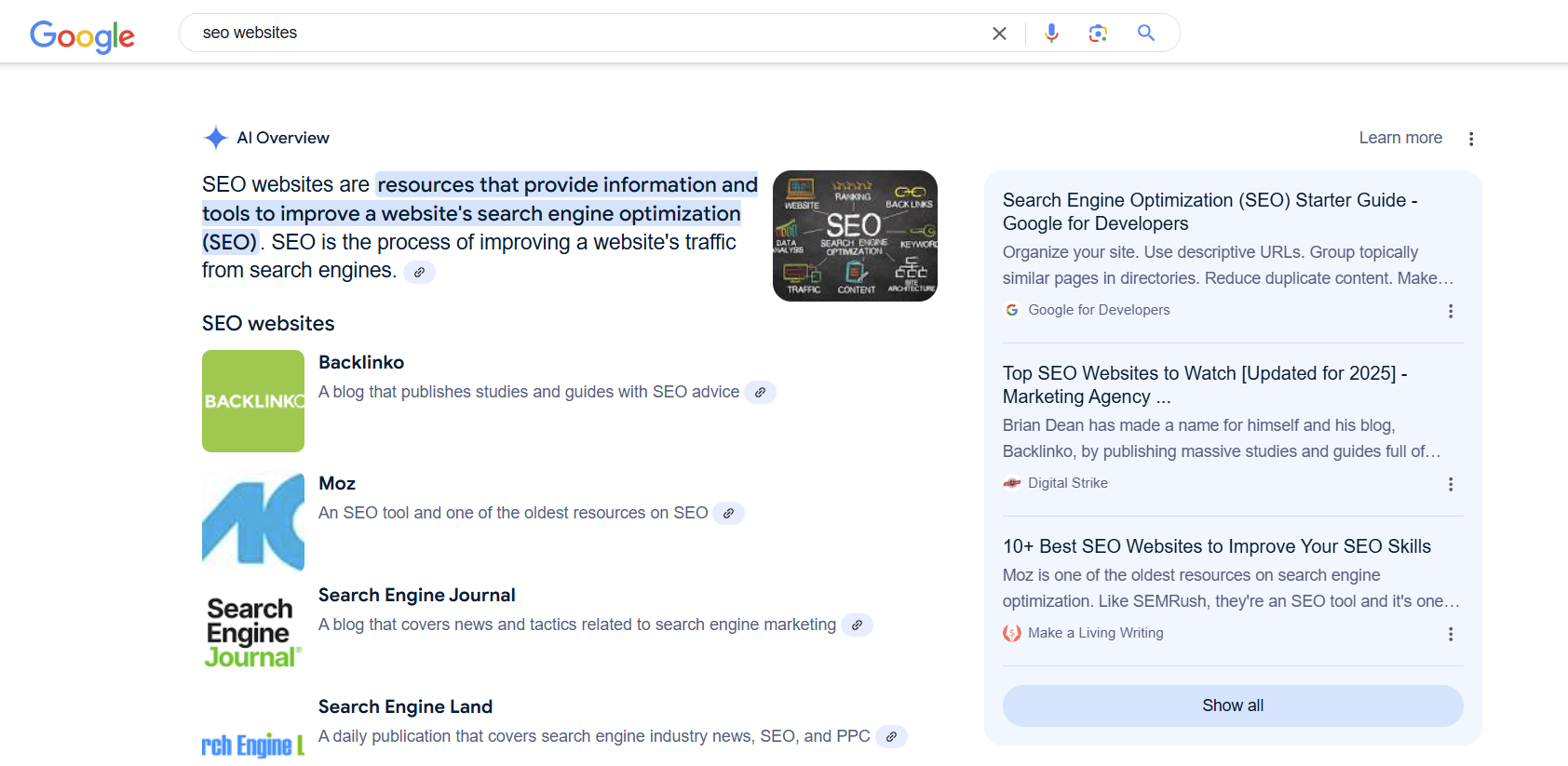Digital marketers across all verticals and industries know the power of search engine optimization (SEO) and its ability to boost website visibility. SEO’s new AI-powered cousin, generative engine optimization (GEO), has hit the digital marketing stage, leaving many online marketers to wonder just how GEO affects visibility and authority… and how to harness it for their own brands.
Here’s what you need to know about generative engine optimization, including the best GEO practices.
What is Generative Engine Optimization and How Does It Work?
Let’s start at the beginning: just what is GEO?
GEO stands for generative engine optimization. It means optimizing your content so that it shows up in Google AI Overviews [formerly Google Search Generative Experience (SGE)] or another search platform’s AI overviews.
AI overviews are what you may have noticed at the top of many search engine results pages (SERPs) in the past year. They are AI-generated responses to user queries in traditional search engines.

Artificial intelligence crafts these summaries based on the web’s best-ranking content for relevant queries. These overviews include citations of where they received their information.
GEO is all about getting cited in those overviews to boost brand recognition and awareness and less about driving organic search traffic to your site.
What are Generative AI Models?
Generative AI models are AI tools that generate content using technology like large language models (LLMs), a type of natural language processing (NLP) technology. These models can understand human language, consume content, and synthesize what they have learned to generate something new, including text, images, and videos.
Popular AI models include ChatGPT, DALL-E, and Midjourney.
What are Generative AI Engines and How Do They Work?
Generative AI engines power AI models and other tools necessary to run generative search engines. They provide the framework and infrastructure necessary to train AI models. Some AI models, like ChatGPT, are also considered AI engines.

What are AI-Driven Search Engines?
AI-driven search engines, or generative search engines, are AI-powered search engines. They are search platforms that run on AI algorithms, using real-time data points and natural language processing technology to better understand search behavior and deliver hyper-personalized search results.
Major AI platforms for search include:
- Perplexity, powered by a combination of AI models like GPT-4 Omni and Claude 3.5 Sonnet
- Microsoft Bing AI, powered by a combination of GPT-4 and Prometheus
- Google AI Overviews, powered by Gemini

What is the Difference Between SEO and GEO and AEO?
SEO, GEO, and AEO are all important for marketers to know how and when to use.
Search engine optimization (SEO) means optimizing a brand’s online presence to appear in organic search results for a specific query. SEO relies on tactics like optimizing content for target keywords and using technical SEO strategies to build site authority, optimize the user experience, and encourage backlinks.
Generative engine optimization (GEO) means optimizing a brand’s online presence to appear in AI overviews and other AI platforms. GEO relies on citations to boost visibility.
Answer engine optimization (AEO) means optimizing content for specific user queries. AEO often relies on long-tail keyword research to encourage content visibility in voice search results and other answer engines.
What is the Future of Search?

With new AI tools popping up seemingly left and right, what does the future of search look like for digital marketers, especially in regards to GEO?
Digital Strike can’t see the future or guarantee future-proof strategies. What Digital Strike can do is use past experience and current successes to make predictions and offer results-based recommendations for success in an ever-evolving digital landscape.
Experience says that companies that use AI tools and platforms smartly will stay ahead—that includes leveraging GEO to boost visibility.
Experience also says that the best GEO strategies are traditional SEO strategies.
In other words, businesses can leverage generative engine optimization to improve online visibility by implementing common-sense search engine optimization strategies.
Some of the top SEO strategies Digital Strike’s team of experts use every single day include:
- Run technical SEO audits. Technical SEO refers to the technical aspects of SEO that affect site performance and includes concerns like website crawlability, headings, duplicate content, and page load speed.
- Prioritize user experience. At the end of the day, despite the presence of AI and search algorithms, the internet is first and foremost for people. Prioritizing quality user experiences means getting rewarded in SERPs. Ways to offer a quality experience includes boosting site speed and improving the readability of content.
- Optimize content for user intent. Content creation should always address user needs and align with user intent, or why someone is consuming content (entertainment, information, shopping, etc.). High-quality content avoids keyword stuffing and encourages backlinks in addition to providing positive experiences for site visitors.
- Use schema markup (structured data). Structured data lives in a website’s code and helps search platforms understand your content better, which can push content up in search rankings.
- Conduct thorough keyword research. Search volume and other metrics are just numbers. A true SEO specialist needs to look past the numbers and see a story. Storytelling begins with asking the right questions: Why are people searching for certain keywords? What are users hoping to gain by interacting with content? How are people finding content?
- Build authority. People trust authorities. Smart SEO (and, by extension, GEO) strategies focus on building trustworthiness by crafting authoritative content that will cite sources, encourage backlinks, and address user concerns.
Generative engine optimization is making big waves in the digital marketing industry. While GEO is new, it’s not complicated. The “secret” to GEO is smart SEO and other digital marketing strategies.






